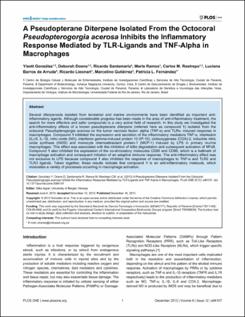A Pseudopterane Diterpene Isolated From the Octocoral Pseudopterogorgia acerosa Inhibits the Inflammatory Response Mediated by TLR-Ligands and TNF-Alpha in Macrophages
Fecha
2013-12-16Autor
González, Yisett
Doens, Deborah
Santamaría, Ricardo
Ramos, Marla
Restrepo, Carlos M.
Barros de Arruda, Luciana
Lleonart, Ricardo
Gutiérrez, Marcelino
Fernández, Patricia L.
Metadatos
Mostrar el registro completo del ítemResumen
Several diterpenoids isolated from terrestrial and marine environments have been identified as important anti-inflammatory agents. Although considerable progress has been made in the area of anti-inflammatory treatment, the search for more effective and safer compounds is a very active field of research. In this study we investigated the anti-inflammatory effects of a known pseudopterane diterpene (referred here as compound 1) isolated from the octocoral Pseudopterogorgia acerosa on the tumor necrosis factor- alpha (TNF-α) and TLRs- induced response in macrophages. Compound 1 inhibited the expression and secretion of the inflammatory mediators TNF-α, interleukin (IL)-6, IL-1β, nitric oxide (NO), interferon gamma-induced protein 10 (IP-10), ciclooxygenase (COX)-2, inducible nitric oxide synthase (iNOS) and monocyte chemoattractant protein-1 (MCP-1) induced by LPS in primary murine macrophages. This effect was associated with the inhibition of IκBα degradation and subsequent activation of NFκB. Compound 1 also inhibited the expression of the co-stimulatory molecules CD80 and CD86, which is a hallmark of macrophage activation and consequent initiation of an adaptive immune response. The anti-inflammatory effect was not exclusive to LPS because compound 1 also inhibited the response of macrophages to TNF-α and TLR2 and TLR3 ligands. Taken together, these results indicate that compound 1 is an anti-inflammatory molecule, which modulates a variety of processes occurring in macrophage activation.

